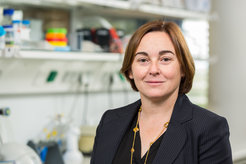Ruth Ley
Microbiome Science
Max Planck Institute for Biology Tübingen
Faculty in: TIPP, IMPRS

Vita
- PhD, University of Colorado, Boulder, 2001
- Postdoctoral training, University of Colorado, 2001-2004; Post-Doc, Instructor, and Research Assistant Professor, Washington University School of Medicine, 2004-2008
- Assistant and Associate Professor at Cornell University, 2008-2016
- Director at the MPI for Biology since 2016
Research Interest
We address fundamental questions about the symbiosis between microbiome and human host. We take an evolutionary and genetic approach to identify microbiota with key roles in the host-microbiome relationship, which we then interrogate for their molecular underpinnings in animal and in-vitro models. Our population-level work has led us to focus on the microbial ecology and evolution of various microbiota, including methanogenic Archaea in the human gut.
Metabolic signatures of methanogen presence in the human gut microbiome - We investigate the question of how methanogens interact with bacteria in the microbiome to shape its metabolite output. We first search for co-variation between the presence of metabolic pathways and/or specific taxa in gut microbial metagenomes, and metabolite profiles. We then model the predicted interactions by placing chosen partners together in vitro.
Host-adaptation in methanogens - We are conducting an extensive comparative genomics analysis of host-associated and non-host associated methanogens. Comparisons of these genomes should enable us to assess the specific adaptations methanogens have made to the gut of humans and other hosts. In our comparative analyses, we are focusing initially on the genes encoding adhesins and formate dehydrogenases. The former has been shown to be important for host colonization and mediating direct interactions with specific microbes, while the later mediates growth on formate, a trait that varies greatly among gut methanogens.
Role of lipids in microbial-host interactions – We focus on the exchange of lipids in the gut between microbiota and hosts. Inositol lipids are also important bioactive lipids in eukaryotes, but rare in Bacteria. They are known mostly for their pathogenicity role in the intercellular pathogen M. tuberculosis. We have investigated the metabolic pathway for inositol lipid production in Bacteroides thetaiotaomicron and showed, using single B. theta gene KOs targeting the operon, that it uses a phosphoinositol phosphate intermediate, much like M. tuberculosis. Gene homology searches identified many other Bacteroides relatives with the inositol lipid pathway, including a second operon more similar to the eukaryotic pathway. Surveying >160 genomes of Bacteroidetes indicates that a majority have one or the other pathways. We are currently investigating the second pathway, and we plan to study the relevance of bacterial inositol lipids in host interactions.
Available PhD Projects
- Currently not recruiting PhD students
Selected Reading
- Suzuki TA, L Fitzstevens, VT Schmidt, H Enav, K Huus, M Mbong, BR Adegbite, JF Zinsou, M Esen, TP Velavan, AA Adegnika, L Huu Song, TD Spector, AL Muehlbauer, N Marchi, R Blekhman, L Segurel, ND Youngblut, P Kremsner, RE Ley. Codiversification of gut microbiota with humans. bioRxiv 2021.10.12.462973 (2021)
- Heaver SL, HH Le, P. Tang, A. Baslé, J. Marles-Wright, EL Johnson, DJ Campopiano, Ley, RE. Inositol lipid synthesis is widespread in host-associated Bacteroidetes. BioRxiv https://doi.org/10.1101/2021.04.26.441525 (2021)
- Youngblut ND, Reischer GH, Dauser S, Maisch S, Walzer C, Stalder G, Farnleitner AH, Ley RE. Strong influence of vertebrate host phylogeny on gut archaeal diversity. Nature Microbiology. Oct 26. doi: 10.1038/s41564-021-00980-2. Online ahead of print. (2021)
- Ruaud A, Esquivel-Elizondo S, de la Cuesta-Zuluaga J, Waters JL, Angenent LT, Youngblut ND and Ley RE. Syntrophy via Interspecies H 2 Transfer between Christensenella and Methanobrevibacter Underlies Their Global Cooccurrence in the Human Gut. mBio 11 (1) e03235-19 (2020)
- Youngblut ND, Reischer GH, Walters W, Schuster N, Walzer C, Stalder G, Ley RE and Farnleitner AH. Host diet and evolutionary history explain different aspects of gut microbiome diversity among vertebrate clades. Nature Communications 10: 2200 (2019)
- Goodrich JK, Davenport ER, Waters JL, Clark AG and Ley RE. Cross-species comparisons of host genetic associations with the microbiome. Science 352: 532-535 (2016)
